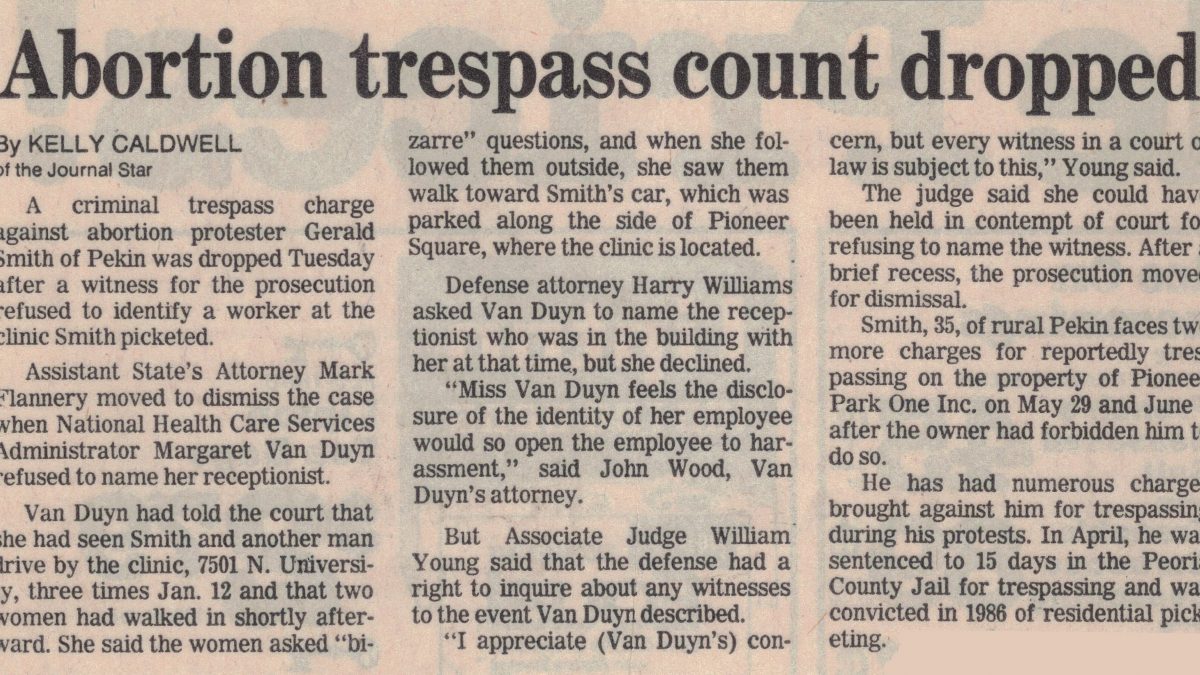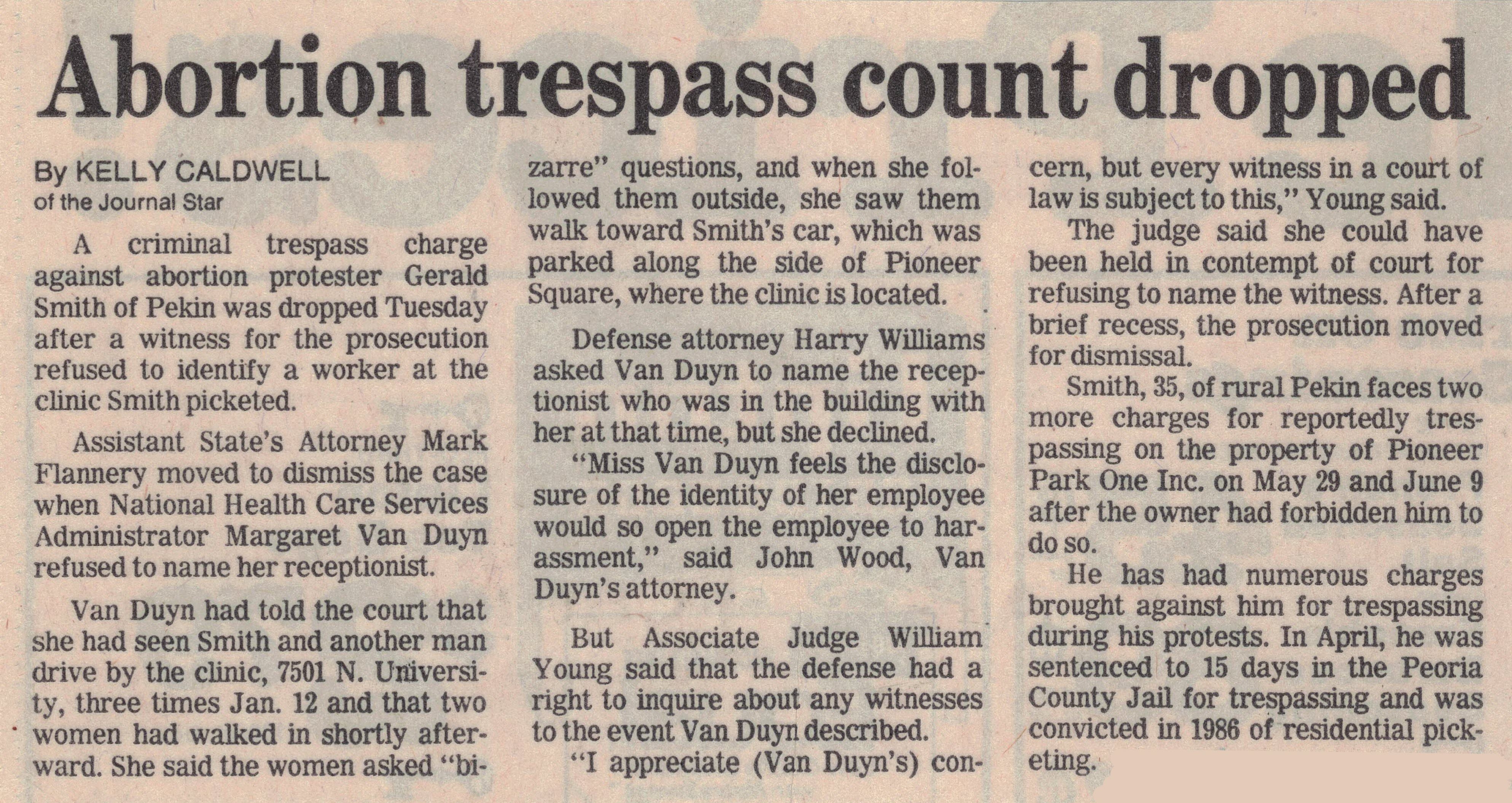The Intentional Destruction of a Stellar Reputation
The Intentional Destruction of a Stellar Reputation

The copy of the article shown above appeared in the Peoria Journal Star on July 2, 1987. The article explains how I was able to get a criminal case against a pro-life activist dismissed, because of the failure of the prosecution to disclose a witness. My client, Gerald (Jerry) Smith, was a well-known local pro-life activist who was frequently arrested for trespassing on the property where the local abortion clinic was located. In the case that was referenced in the article, Jerry was charged with Criminal Trespass to Property, a Class A misdemeanor that was punishable by up to a year in jail, and up to a $1,000 fine.
The Sixth Amendment to the U.S. Constitution provides that a person who is accused of a federal crime has the right to confront witnesses who are against him. This constitutional provision serves three fundamental purposes: (1) it ensures that witness testimony must be under oath, (2) it allows an accused to cross-examine witnesses who testify against him, and (3) it allows jurors to assess the credibility of a witness by observing the witness’s testimony and behavior.
The Fifth Amendment to the U.S. Constitution provides that no person shall be deprived of “life, liberty or property without due process of law.”
The legal requirements of the fifth and sixth amendments were extended to the states by the 14th Amendment to the U.S. Constitution. Those requirements support the concept that is enshrined in the U.S. Constitution — that a person is presumed to be innocent until proven guilty. The burden of proving guilt rests with the accuser. We would all be in deep trouble if we could be found guilty of a crime based only on the accusation of another person.
Due Process provides that a person is entitled to (1) appear before an unbiased tribunal, (2) advance notice of the proposed action or the charges that are being asserted against him, (3) the opportunity to present evidence to the tribunal, (4) advance notice of the evidence that the opposing party has against him, (5) the right to cross-examine adverse witnesses, (6) the right to have the final decision of the tribunal based exclusively on the evidence presented, (7) the opportunity to be represented by an attorney, (8) the right to have a record of the proceedings prepared and preserved, and (9) the right to have written findings of fact and the reasons for the final decision.
The above-referenced due-process rights are what Judge Brett Kavanaugh should have been provided in the proceedings that took place in the U.S. Senate. What was obvious to anybody who paid attention to the proceedings was that there were no witnesses presented to support the allegations that were made against Judge Kavanaugh. The woman who accused Kavanaugh of sexually assaulting her when she was 15 and he was 17, had no witnesses, documents, or other evidence to support her claim that he had sexually assaulted her.
It was her word against his word. She may have actually been assaulted by someone at a party when she was 15, but because she failed to immediately report the crime to local authorities, no investigation ever took place. There was no information gathered concerning the time, date, and location of the crime. No witnesses were identified and spoken to. No evidence, such as fingerprints and clothing, was collected and preserved.
There may be a good reason why a 15-year-old girl would not report such an incident to her parents or local authorities. She may have feared that she would be severely criticized by her parents because she was prohibited from attending high school parties where alcohol was present. There could also be other reasons that she decided not to reveal the incident, such as a fear that she would be ostracized by some of her classmates or humiliated by relatives or members of her community.
Regardless of why she failed to report the incident, even if it was Kavanaugh who attacked her, the question arises as to whether she was justified in going public with a crime that occurred more than 36 years ago, knowing that her revelation would cause grave harm to the reputation of a family man with an exemplary record of behavior and public service.
The first time I thought about how the claim of sexual abuse was going to permanently harm Judge Kavanaugh’s reputation was when I read a comment from Ana Navarro, a political commentator for CNN: “This is going to be a huge black cloud on top of Judge Kavanaugh’s career, the rest of his life. It is going to be in his obituary, the fact that this allegation came through.”
Judge Kavanaugh’s stellar career and reputation have been forever tarnished. The Modern Catholic Dictionary defines the word “reputation” as follows.
The good name that a person enjoys in the public estimation. Everyone has a right to his or her good name, even the deceased, and moral persons, e.g., a community. If one’s good name is genuine, hence deserved, a person has an absolute right that no one may injure it. One’s right to a reputedly good name is relative and restricted, since the greater common good requires that, at times, even secret faults may be revealed. There is no injury, however, to reputation when the faults or defects mentioned are already publicly known. An unjust injury is committed by every sin of calumny, and by revealing real faults when the disclosure serves neither the common good nor legitimate private welfare.
A majority of Catholics would be surprised to find out that revealing the truth about someone can, in certain circumstances, be a sin. I’m referring to is the sin of detraction, which is defined by the Modern Catholic Dictionary:
Revealing something about another that is true but harmful to that person’s reputation. It is forbidden to reveal another person’s secret faults or defects, unless there is proportionate good involved. The fact that something is true does not, of itself, justify its disclosure. Detraction is a sin against justice. It robs one of what most people consider more important than riches, since a person has a strict right to his or her reputation whether it is deserved or not. (Etym. Latin detractio, a withdrawal.)
Here’s what Fr. John A. Hardon, S. J., a Catholic theologian and author of more than 40 books on the Catholic faith, wrote about the sin of detraction:
The essence of detraction is the unwarranted disclosure of a hidden failing, which implies that there are occasions when the disclosure can and even should be made.
When the revelation of another person’s fault is necessary or very useful, as in defense of self or of others, no injustice is done in revealing it. This would be the case when the failing or defect is made known to parents, or superiors, or for the purpose of seeking counsel or help, or to prevent harm to others, though again, there must be adequate proportion between the lessening of a person’s reputation (which is not intended) and the good to be achieved by the disclosure (which is intended). This would cover such contingencies as anticipating unjust harm to oneself in the law courts, or even seeking consolation of a trusted friend by revealing the injustice done.
A strong argument can be made that the woman who accused Judge Kavanaugh of sexual abuse committed the sin of detraction, even though she may have truly believed that he was the person who committed the crime. Judge Kavanaugh was completely defenseless in the proceedings that took place in the U.S. Senate. If the alleged crime had been promptly reported by the woman, the police would have immediately arrested Kavanaugh. His parents would have then hired a lawyer and a complete investigation would have been conducted. He would have then been able to present hard evidence as to where he was at the time of the alleged occurrence and whether he actually committed the crime.
What happened to Judge Kavanaugh in the U.S. Senate was in some ways similar to what happened to Jesus Christ in the proceedings that took place before Pontius Pilate. I’m not saying that Judge Kavanaugh is Jesus Christ, but like Christ, it was impossible for Kavanaugh to defend himself against the scurrilous allegations that were made against him.
Let’s face it. The unjust proceedings that took place against Kavanaugh in the U.S. Senate were for one primary purpose — to keep him off of the U.S. Supreme Court because he’s a conservative Catholic who is viewed by many as a threat to the 1973 U.S. Supreme Court decision of Roe v. Wade, which granted women the legal right to kill their unborn children.
In our modern world, where the majority of people feel justified in gossiping and spreading unsubstantiated rumors about other people, the sin of detraction is the furthest thing from most people’s minds. Next time you know something that is true about another person but could harm that person’s reputation, you should think twice before you reveal it to anyone else.





3 Comments
Excellent explanation! Thank you!!
Dear Harry and Georgette – Thank you for bringing the truth to all who read this. I’ve always felt that Judge Kavanaugh was being accused falsely, for political reasons He is a good man, and the write-up in the Catholic Post recently was excellent! It spoke of his goodness, and nothing about what he was being accused of. Blessings to both of you, with loving prayers. Sister Roberta
[…] to do with our Catholic faith and the teachings of the Catholic Church. That will be the topic of my article next week. Print this […]